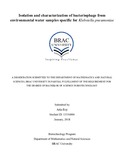Isolation and characterization of bacteriophage from environmental water samples specific for Klebsiella pneumoniae
Abstract
Klebsiella pneumoniae is a clinically important pathogen that is frequently associated with multidrug resistance. Recently, some of its strains have acquired superbug status. Over time it is getting difficult to treat Klebsiella pneumoniae induced infection using antibiotics and it is necessary to identify new approach. Bacteriophages are bacteria-infecting viruses that were previously used to treat various bacterial infection in human. Hence, in this study, Klebsiella pneumoniae specific bacteriophage designated as Klpp1 was isolated and characterized for the first time in Bangladesh in order to develop a potential therapeutic agent. Upon host range examination, Klpp1 phage indicated to have a broad host range within genus Klebsiella since it was able to lyse 8 out of 13 different Klebsiella culture but could not infect bacteria from other genera. The isolated phage was able to survive at a temperature up to 60-degree Celsius and was infective in pH range of pH 4.0 to pH 11. The phage was perfectly stable in chloroform but totally lost its infectivity in ethanol. Klpp1 was found to have a latent period of 20 minutes with a burst size of approximately 140 plaque forming unit per infected cell. Therefore, this study provides an addition to the growing number of bacteriophages isolated, particularly Klebsiella pneumoniae specific bacteriophage. The studies on its biological characteristics may provide useful information and knowledge in establishing potential therapeutic agent against Klebsiella pneumoniae infection.

